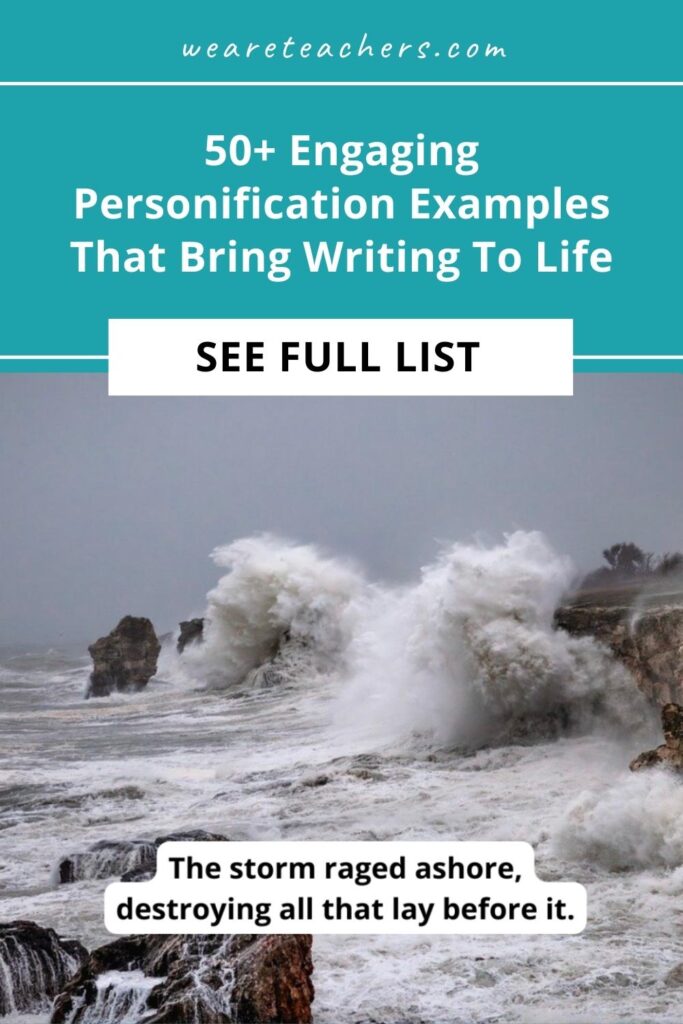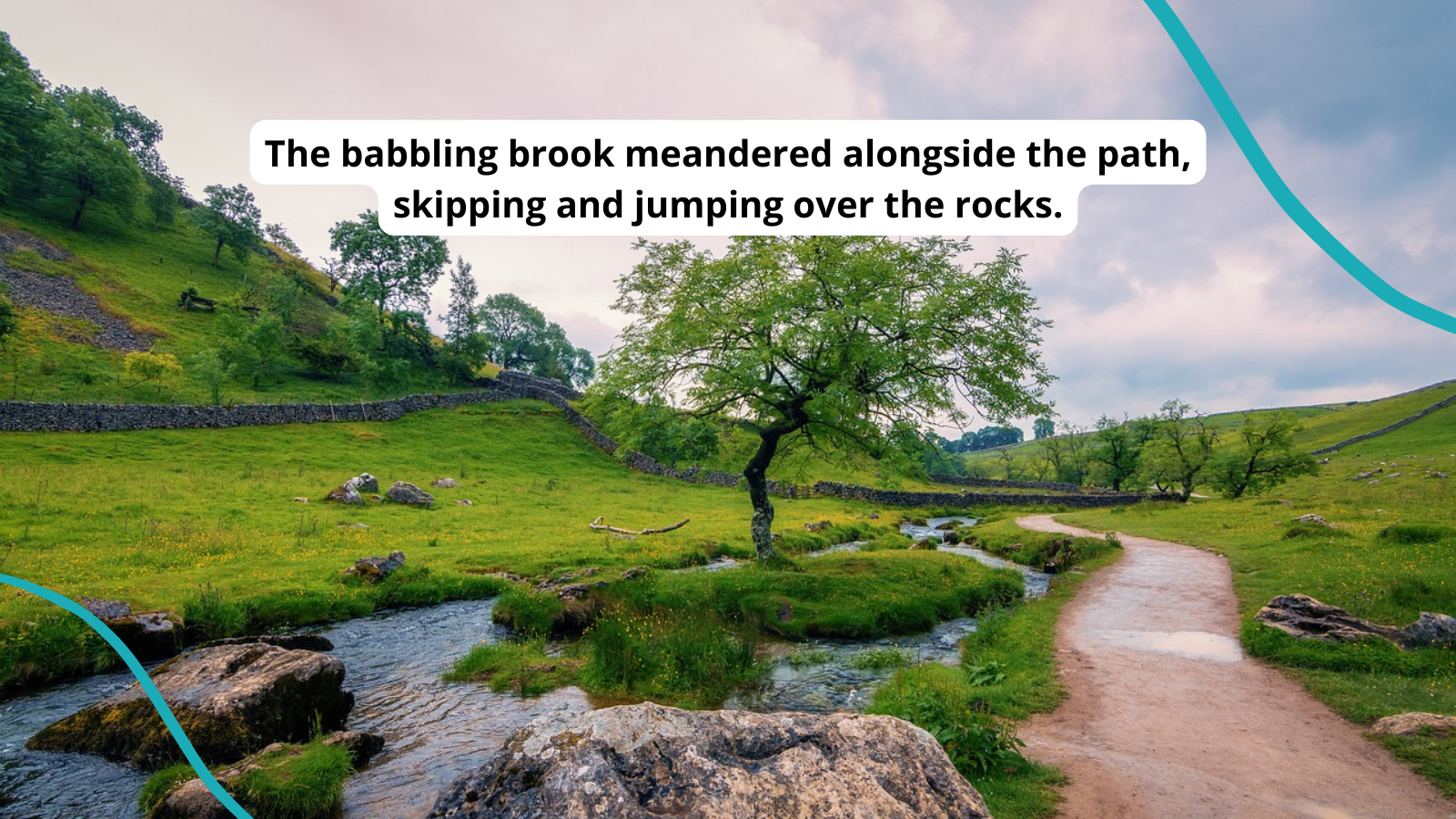Strong writers use literary devices like personification to make their writing more vivid and engaging. Learn the definition of personification, plus find lots of engaging personification examples to share with your students.
What is personification?
Personification is a literary device, a technique authors use to add meaning to their writing. Put simply, writers use personification when they give human characteristics to non-human animals or objects. In other words, an author describes a non-human object as doing something human.
- Example: “The babbling brook meandered alongside the path, skipping and jumping over the rocks.”
In this example, the author doesn’t literally mean the brook babbles, meanders, skips, or jumps. Instead, they use these human activities to make the sounds and actions of the brook more clear to the reader.
Personification vs. Anthropomorphism
These two literary devices are sometimes confused, but they have different meanings. When an author uses anthropomorphism, they have a non-human character literally act in human ways, such as talking animals.
- Personification example: My dog cried mournfully as I left, begging me not to leave him alone for the day.
- Anthropomorphism example: “Don’t go,” sobbed Rex, tears running down his furry nose. “I can’t bear to be alone all day long!”
In the first example—personification—the dog displays human-like behavior but does not literally cry, beg, or speak. In the second—anthropomorphism—the dog does literally cry and talk. Anthropomorphism is common in children’s books and fairy tales, while personification can appear in any kind of writing, including nonfiction.
Importance of Personification
Writers use personification to bring life and meaning to their writing. By associating a description with something human and familiar, they make it easier for their reader to relate to it. When an author gives an object human characteristics, like a “screaming alarm clock” or a “murmuring breeze,” their writing becomes more engaging.
We’ve all had days where we feel like computers “hate” us, or our alarm clock is “scolding” us until we get out of bed. When authors use this type of personification, we can immediately understand the feelings and emotions they’re trying to convey. The setting and atmosphere become clearer, helping us understand human characters a little better.
General Personification Examples
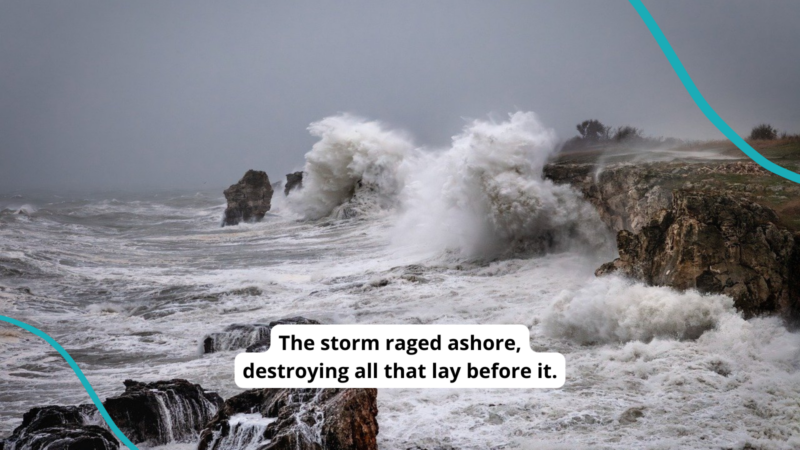
- The flowers danced in the breeze.
- A soft breeze tickled her cheek.
- That hot fudge sundae is really calling my name.
- The sun smiled down on us as we picnicked in the park.
- Time flies when you’re having fun.
- The old stairs groaned with each step he took.
- After a long day, my soft bed beckoned me with open arms.
- Moonlight caressed the water’s surface, glinting on each tiny wave.
- The storm raged ashore, destroying all that lie before it.
- The mountains stood tall and proud, guarding the valley below.
- The suspicious security cam followed her every move, determined to catch her in the act.
- Hungry waves ate away at the shoreline.
- After many false starts, the car’s engine finally coughed to life.
- Dark clouds gathered in the sky, plotting their attack on the land below.
- The typewriter keys jumped and jigged beneath his flying fingers.
- The sweet aroma of freshly baked cookies wooed them all into the kitchen.
- Dawn stretched itself across the landscape, embracing the dew-laden flowers.
- Overhead, the leaves whispered softly in the wind.
- Doubts attacked him left and right as he tried to make a decision.
- The fog crept slowly over the ground, sneaking its way into every hollow.
Personification Examples From Literature
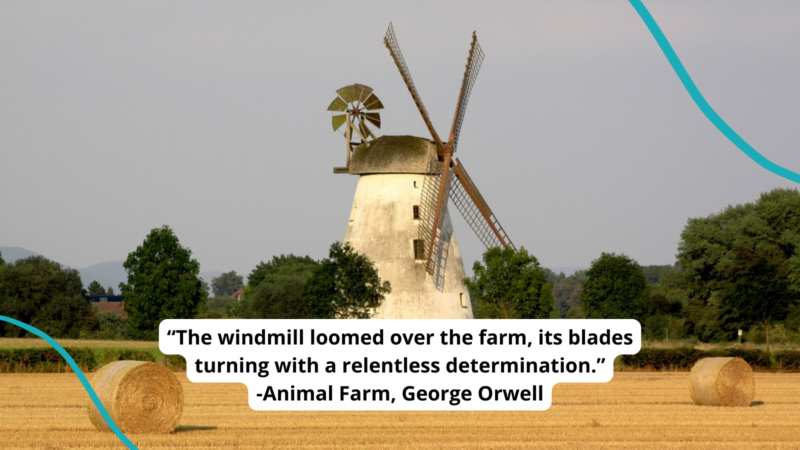
- “There is something subversive about this garden of Serena’s. … It breathes, in the warmth, breathing itself in.” –The Handmaid’s Tale by Margaret Atwood
- “A waft of wind came sweeping down the laurel-walk, and trembled through the boughs of the chestnut: it wandered away—away—to an indefinite distance—it died.” –Jane Eyre by Charlotte Brontë
- “All in vain; because Death, in approaching him, had stalked with his black shadow before him, and enveloped the victim.” –The Tell-Tale Heart by Edgar Allan Poe
- “The ship danced over the waves, eager to return to Ithaca.” –The Odyssey by Homer
- “The windmill loomed over the farm, its blades turning with a relentless determination …” –Animal Farm by George Orwell
- “The fire’s fingers reached out, devouring the pages of the forbidden books.” –Fahrenheit 451 by Ray Bradbury
- “The moors sighed with the weight of the secrets they held, whispering tales of love and revenge.” –Wuthering Heights by Emily Brontë
- “The sun persists in rising, so I make myself stand.” –The Hunger Games by Suzanne Collins
- “Arise, fair sun, and kill the envious moon / Who is already sick and pale with grief …” –Romeo and Juliet by William Shakespeare
- “The Triwizard Cup is waiting. It is waiting for you.” –Harry Potter and the Goblet of Fire by J.K. Rowling
Personification Examples From Poetry
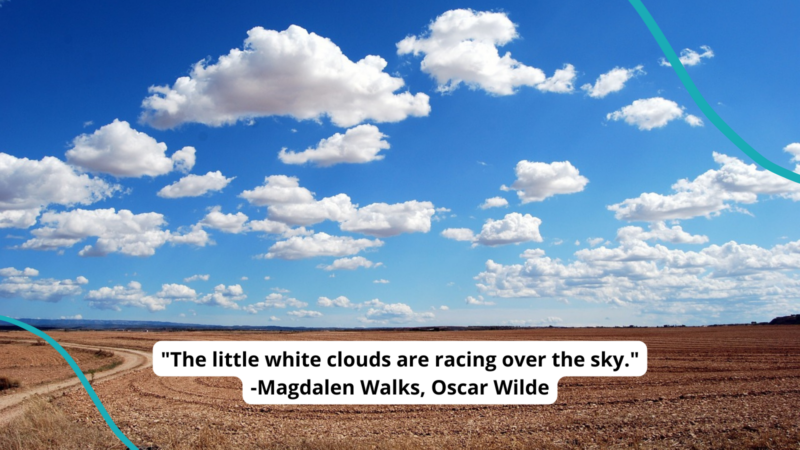
- “Because I could not stop for Death – / He kindly stopped for me – / The Carriage held but just Ourselves – / And Immortality.” –Because I Could Not Stop for Death by Emily Dickinson
- “I wandered lonely as a cloud …” –Daffodils by William Wordsworth
- “The moon was shining sulkily / Because she thought the sun / Had got no business to be there / After the day was done.” –The Walrus and the Carpenter by Lewis Carroll
- “Earth felt the wound; and Nature from her seat, / Sighing, through all her works, gave signs of woe.” –Paradise Lost by John Milton
- “The aspens at the cross-roads talk together / Of rain …” –Aspens by Edward Thomas
- “And the silken, sad, uncertain rustling of each purple curtain / Thrilled me—filled me with fantastic terrors never felt before.” –The Raven by Edgar Allan Poe
- “The troubled sky reveals / The grief it feels.” –Snow-Flakes by Henry Wadsworth Longfellow
- “Eight balloons no one was buyin’ / All broke loose one afternoon. / Eight balloons with strings a-flyin’, / Free to do what they wanted to.” –Eight Balloons by Shel Silverstein
- “The little white clouds are racing over the sky …” –Magdalen Walks by Oscar Wilde
- “The fog comes / on little cat feet. / It sits looking / over harbor and city / on silent haunches / and then moves on.” –Fog by Carl Sandburg
Song Lyrics Personification Examples
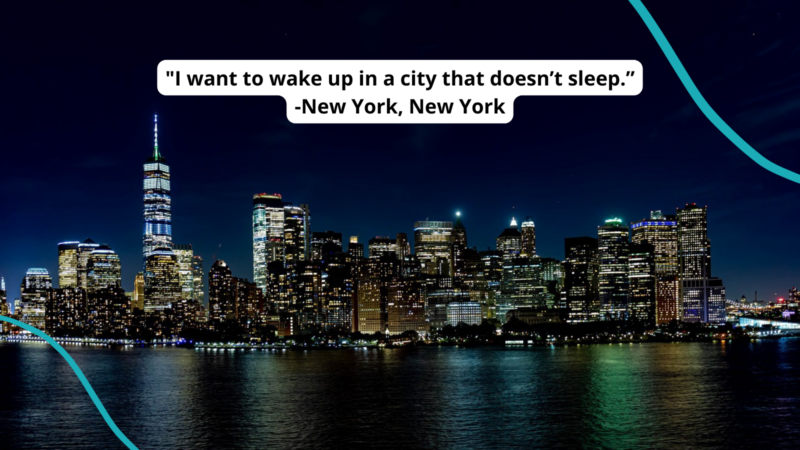
- “You start to freeze as horror looks you right between the eyes.” –Thriller by Michael Jackson
- “And so today, my world it smiles.” –Thank You by Led Zeppelin
- “I want to wake up in a city / That doesn’t sleep.” –New York, New York by John Kander and Fred Ebb
- “Time grabs you by the wrist, directs you where to go.” –Good Riddance (Time of Your Life) by Green Day
- “They reach into your room, oh, just feel their gentle touch. / When all hope is gone, sad songs say so much.” –Sad Songs by Elton John
- “The highway don’t care if you’re all alone.” –Highway Don’t Care by Tim McGraw
- “And the saddest fear comes creeping in …” –I Knew You Were Trouble by Taylor Swift
- “The high yellow moon won’t come out to play.” –Concrete Jungle by Bob Marley
- “A shining new era is tiptoeing nearer …” –Be Prepared from The Lion King
- “Here comes the sun.” –Here Comes the Sun by The Beatles
How do you teach personification in your classroom? Come share your ideas in the We Are Teachers HELPLINE group on Facebook.
Plus, Appealing Alliteration Examples (Plus Teaching Ideas).
